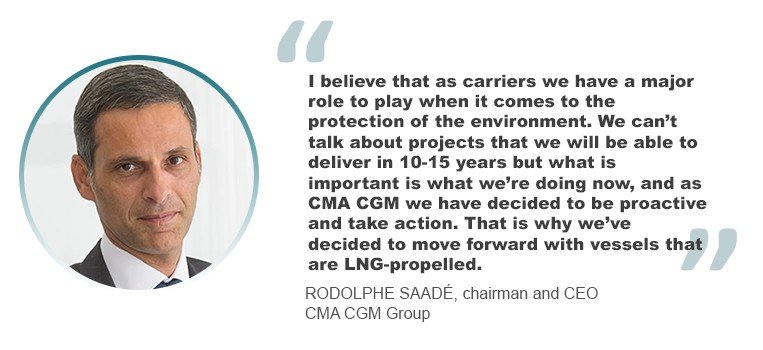CMA CGM is ramping up its decarbonization efforts with the acquisition of LNG-propelled vessels within its fleet – five of the nine ultra-large 23,000 TEU ships on its order already deployed on the Asia-Europe trade – in a bid to reduce the line’s environmental impact.
Rodolphe Saadé, chairman and CEO of CMA CGM Group, said the container transportation and shipping company will also launch six mega containerships for its U.S.-China service in what will become the largest container vessels powered by LNG to call the U.S.

“I believe that as carriers we have a major role to play when it comes to the protection of the environment,” Saadé told the recent TPM21 conference. “We can’t talk about projects that we will be able to deliver in 10-15 years but what is important is what we’re doing now, and as CMA CGM we have decided to be proactive and take action. That is why we’ve decided to move forward with vessels that are LNG-propelled,” he said.
“Maybe LNG is not the technology of the future. Maybe there will be technologies that are far better than LNG, but it is the best technology available for today.”
Saadé said LNG would allow the company to reduce its CO2 emissions by 20%.
“The vessels we are ordering now – the ultra-large ones are LNG propelled. Especially the 23,000 TEU+ vessels, we have ordered nine of them – five already delivered and deployed in the Asia-Europe trade and we are expecting an additional four,” he said.
CMA CGM has already earlier committed to carbon neutrality by 2050.
First to launch LNG vessels between China-US West Coast
At the end of the year, the French ocean carrier said it will also be deploying 15,000-TEU, LNG-propelled vessels from Asia to the US west coast.
“We will be the pioneer in the deployment of LNG vessels from China to Los Angeles Long Beach by the end of this year,” Saadé said during the virtual TPM21 conference in March. “We believe that it is important to deploy LNG vessels on the trans-Pacific, and CMA CGM will do so by the end of this year.”
The CMA CGM chief also noted the carrier’s commitment to the US market, and said that aside from the mega-ships, the company has “many projects going on,” including launching ZEBOX America and hiring hundreds of additional employees “to help us cope with our strong demand.”
ZEBOX is CMA CGM’s specialized support structure dedicated to startups, focusing on transport, logistics and mobility, and industry-related innovations, among others.
“We are very committed to the US market. We have a very strong presence in this market and we’ve decided that as we’re looking at growing and developing our presence in America. [We’re also] hiring 400 U.S. employees to allow us to keep up with our developments in the U.S.,” Saadé said.
Adaptability, tech investments moving forward
Saadé said nobody could predict for certain when the recovery could take place amid the ongoing Covid-19 pandemic. Nonetheless, he noted that as the industry recovers, the shipping industry has learned the importance of adaptability and tech investments to sustain operations, even in dire situations like the pandemic.
“I would not say it’s going to last one, two or three months. I wouldn’t know. But at least what we understand, is that the more people will be vaccinated, the more chances we will get out of the crisis,” Saadé said. “[But from] what we understand, is towards the summer of 2021, the situation should [begin to] go back to normal.”
Talking about the lessons learned from the pandemic, Saadé noted that “adaptability” is the ultimate takeaway from the coronavirus crisis.
“We have been able to adapt to a difficult situation and I think this is the lesson that we have to learn. Number two is technology. We have seen that if we are well-equipped with digital solutions, we are in a position to keep doing business,” he said.
“Our objective at CMA CGM is to come up with simple innovation that will answer the needs of our customers. The more complex a solution is, the less it will be used.”
Meanwhile, Saadé said that as the industry moves to invest in technology, innovation and promises better service, shippers need to understand that “service has a price,” as he talked about reliability of service.
“All these come at a price; service cannot be free of charge. Service has a price. We as a shipping line are investing heavily in technology, in assets, terminals, vessels, LNG-propelled ships. And this is what we have to explain to our customers,” the CMA CGM chief executive said as disruptions impact container liners’ reliability.
“There needs to be an understanding that shipping lines cannot lose all the time.”
CMA CGM’s venture into air cargo
Meanwhile, Saadé said the recent announcement of CMA CGM’s new specialist air freight division – CMA CGM Air Cargo – is meant to address current capacity shortages in the market.
“The past 40-something years, we were a shipping line. By having a chance to meet with customers and understand their needs, we have decided to invest in logistics so that we can offer the shipping and logistics solution and complement their needs,” Saadé said, referring to the company’s acquisition of CEVA Logistics.
“During the Covid-19 crisis, we have noticed that a lot of passenger airplanes being stuck and not being able to fly. There was a shortage of space onboard airplanes; that is why I said ‘why don’t we also invest in full freighters,’” he continued.
“We know this period is not going to last forever but at least for the next few years, we will be in a position to offer our customers who are looking for express solutions space onboard full freighters.”
Charlee C. Delavin


-x-large.jpg)
